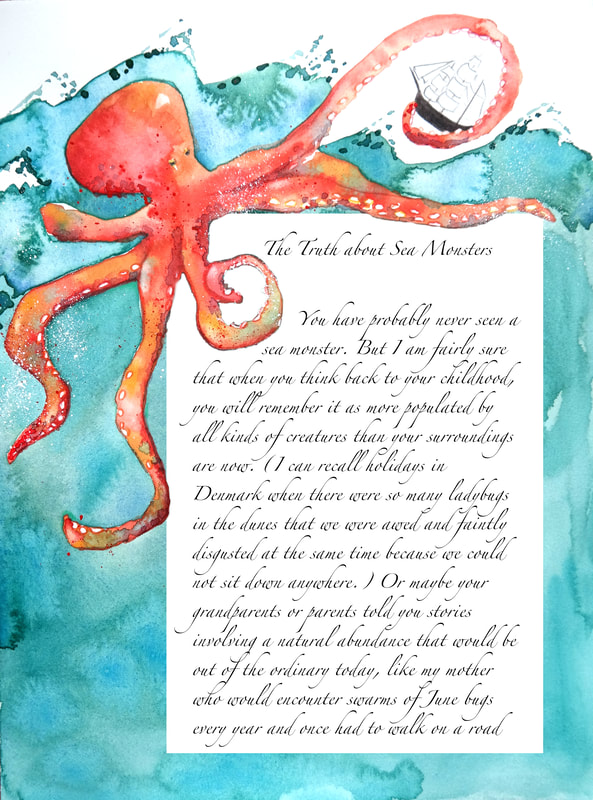|
You have probably never seen a sea monster. But I am fairly sure that when you think about your childhood, you will remember it as more populated by all kinds of creatures than your surroundings are now. (I for one can recall holidays in Denmark when there were so many ladybugs in the dunes that we were awed and faintly disgusted at the same time because we could not sit down anywhere.) Or maybe your grandparents or parents told you stories involving a natural abundance that would be out of the ordinary today, like my mother who would encounter swarms of June bugs every year and once had to walk on a road that seemed to be paved with frogs.
Sadly, this natural bounty is a thing of the past in many regions of our planet, and we tend to fondly remember our childhood as a time when the world was still buzzing with life. This belief exists alongside the stories we have all heard about the animals that used to roam the countryside even further in the past but are now (almost) extinct – think of wolves and bears in Europe or the bison of North America. Can you imagine that the seas and rivers were once so full of fish that it sometimes looked like you could just wade out into the water and continue walking on the backs of them? These fish were not only more numerous, they were much bigger than the ones that are caught today because due to their sheer abundance, many more reached maturity than is the case now. So why is it that we don’t use these historical levels of biodiversity as our benchmark when we think about nature today, but keep referring to our own childhood experience in comparison – an experience of a fauna that was already severely depleted? It looks like while we are intellectually able to grasp what the world had lost in terms of richness even before we were born, only our childhood experience resonates with us emotionally. The explanation for this skewed perception is what is known as shifting baseline syndrome. In Wilding, Isabella Tree defines it as a “continuous lowering of standards and the acceptance of degraded natural ecosystems” that, in a nutshell, stems from us clinging unconsciously to what we considered “natural” when growing up. The problem according to Tree is that each generation creates a new definition of what is “natural”, so when the baseline drops it is considered the new normal, leading us to suffer from “pre-baseline amnesia”. Or, as George Monbiot puts it in Feral, “ours is a dwarf and remnant fauna, and as its size and abundance decline, so do our expectations, imperceptibly eroding to match the limitations of the present.” Even scientists have a hard time freeing themselves from these preconceptions. But what has this got to do with sea monsters? Over hundreds of years sailors kept reporting encounters with huge creatures like the legendary kraken, some of them allegedly big enough to toss a ship into the air. Modern-day scientists believe that the most likely marine animal behind these sightings is the giant squid, an elusive denizen of the deep seas that is big enough to grapple with sperm whales, often leaving them with enormous scars from its suction cups. The rest, it is thought, are tall tales, yarns spun by seamen terrified of the unfathomable depths beneath the hulls of their ships. But just imagine for a moment that this could be just another case of “pre-baseline amnesia”. What if there actually were creatures then that were even bigger than giant squid but that simply no longer exist? Or what if giant squid were even more gigantic back then? What if “there lived dragons where none live now”, to borrow one of George Monbiot’s phrases? We will probably never know the truth about sea monsters, but we can at least try to open our eyes to the actual degradation of our environment and attempt to restore some of its old glory, for example by rewilding. Quotes and inspiration: Isabella Tree, Wilding George Monbiot, Feral Mark Kurlansky, Cod Robin Wall Kimmerer, Braiding Sweetgrass
0 Comments
Leave a Reply. |
Illustrated Thoughts
Hi, I'm Birte and I make (live) illustrations. This is where I express myself in words and images about topics that have made me think. Archives
February 2024
Categories
All
|

 RSS Feed
RSS Feed